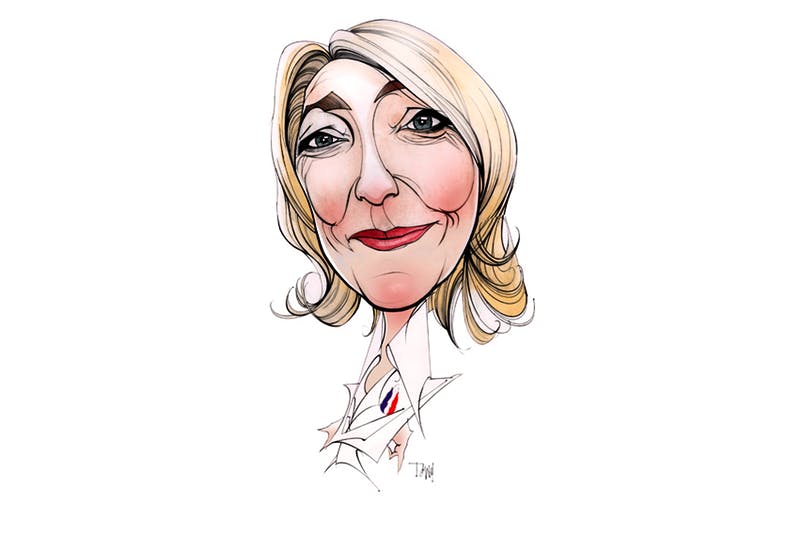Boris Johnson may have received a lukewarm reaction from Emmanuel Macron to his emphatic election victory last month but one French politician was cock-a-hoop at the result. Shortly after the scale of the Conservative win was clear, Marine Le Pen tweeted her delight, declaring that ‘the crushing victory of Boris Johnson shows that neither manoeuvring nor intimidation can sway a people who have decided to take their destiny in their own hands.’
Other than finding the EU objectionable, Johnson and Le Pen have little in common and economically, the Frenchwoman’s desire to nationalise banks is more in line with Jeremy Corbyn’s worldview. But the triumph of the Conservative leader has been a tremendous fillip for her.
Like Johnson, Le Pen has had a rough couple of years. After the humiliation of her live television debate with Emmanuel Macron in May 2017, when she blew her slim chance of winning the presidential election, Le Pen went into political hibernation. There were rumours of depression and many commentators, including this one, wrote her political obituary.
Her salvation was the evaporation of her arch enemy’s aura of invincibility, which began with the ‘Benalla Affair’ in the summer of 2018. Suddenly the president was vulnerable, yet where were his opponents to seize on his weakness? The centre right Republicans and centre left Socialist Party were and remain a demoralised rabble, while Jean-Luc Mélenchon of the far-left France Insoumise had failed to capitalise on his decent polling in the first round of the 2017 election.
That left Le Pen, who had only recently returned to active duty, renaming her National Front party the ‘National Rally’ in a bid to reassert her dominance and promising her dispirited followers that a new ‘glorious chapter’ beckoned.
This period in Le Pen’s life coincided with Johnson’s brief and controversial tenure as foreign secretary, and yet 18 months after resigning that post he won a landslide election victory. If Monsieur Johnson can do it, thinks Le Pen, why can’t I in 2022?
What a comeback it would be, and what a rebuff to her father, Jean-Marie, the founder of the National Front, who said of his daughter last September that ‘she lacks self-confidence, which explains her faults, her dictatorial side.’
Le Pen’s riposte was swift, vowing to contest the 2022 election. ‘I’m ready to do the job, the job that Emmanuel Macron isn’t doing,’ she announced. ‘The reality is that we’ve had a lot of big promises, a lot of hopes for a lot of French people that things would change. But we have once more a veritable social and economic cataclysm.’
This ‘cataclysm’ is not a figment of Le Pen’s imagination. Last year in France was one of strikes, riots, terrorist attacks and an underperforming economy, not exactly the future envisioned by Macron on that May evening in 2017 when he promised his delirious supporters at the Palais du Louvre that he would restore France’s grandeur.
The country is in crisis and Le Pen senses an opportunity to take down the president, hence her support for the striking railway workers, now in their fifth week of protest. Her best chance of winning power is to do what Johnson did and persuade the left-leaning blue-collar sector to lend her their vote. Give me a chance, she will ask them, because I can’t be any worse than the man currently bringing France to its knees.
To that end Le Pen will have taken heart from a poll in November that found that 63 per cent of people who voted for the far-left France Insoumise in last year’s European elections would back Le Pen before Macron in a presidential run-off in 2022.
These working-class men and women differ little in outlook and income from the Britons in Blyth Valley and Bolsover who voted Conservative for the first time last month. They aren’t racist or stupid but they are proud of their country and its traditions, and they don’t appreciate it when their president proclaims that there is no such thing as French culture. They want a politician who talks to them, not at them, which is Johnson’s genius; Le Pen hasn’t the PM’s charisma but her plain speaking patriotism resonates far more with the French working-class than the haughty technocrat they see when they look at their president.
Macron has never taken Le Pen seriously, in part because of her personal flaws but also because he believes the family name is so toxic that in the second round of a presidential election the people would vote for anyone but her. Therefore he thinks that it doesn’t matter how much he angers the working-class in pursuing his progressive agenda because he is confident that ultimately they will back him and not Le Pen.
But she has learned from both Brexit and Trump’s success, and as campaigning starts in earnest this month for the municipal elections in March she will portray herself as the champion of the culturally insecure ‘little people’ against the power of the Parisian political elite, personified by the president.
Le Pen knows that the British Prime Minister wouldn’t touch her with a bargepole but she doesn’t care. What matters isn’t Johnson’s endorsement, but his example, because he has shown, as Trump has, that success awaits the political leader who pitches his campaign to the ‘Somewheres’ and not the ‘Anywheres’.







Comments